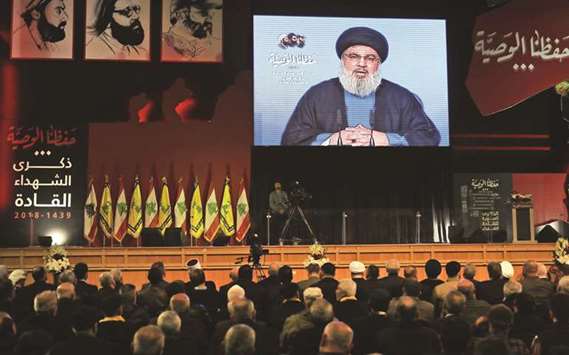Hezbollah yesterday urged Lebanon to stand firm in its offshore energy dispute with Israel and warned it could act against Israeli oil facilities if necessary, as the US mediates between the two countries.
In a televised address, the leader of the heavily-armed movement, Sayyed Hassan Nasrallah, described the issue as a “battle for all of Lebanon”.
“If Lebanon’s Higher Defence Council were to decide that (Israeli) offshore oil and gas plants...should be forbidden from working, I promise they would stop working within hours,” he told a rally.
US diplomats have been mediating between Lebanon and Israel after a spike in tensions that also involved a dispute over a border wall which Israel is building, and Hezbollah’s growing arsenal.
Nasrallah said Lebanon’s territorial waters, and efforts to explore for oil and gas in a block that lies along the contested marine border with Israel has become the most pressing issue.
Lebanon signed its first exploration and production agreements last week with a consortium of France’s Total, Italy’s Eni and Russia’s Novatek.
Nasrallah’s speech came after Lebanon’s senior leaders met with a US envoy yesterday to discuss the dispute.
A top Lebanese official told the diplomat that current US proposals for a resolution to the energy issue were not acceptable.
The powerful Hezbollah is part of Lebanon’s coalition government, which includes almost all the country’s main political parties.
Washington also supports the Lebanese military, funding its forces partly as a counterweight to Hezbollah.
Nasrallah said Lebanese officials should not fear Israeli military might, but should warn US officials of Hezbollah’s own strength.
He also said the United States was not an honest broker, and that Lebanese officials should not be fooled by their mediation.
“If the Americans come and say you must be responsive so that I restrain Israel from you, tell the Americans: they must accept (Lebanon’s) demands so that we hold Hezbollah back from Israel,” he said. “The oil wealth is for all the Lebanese.”
US Secretary of State Rex Tillerson visited Lebanon on Thursday and said the United States was engaging with Lebanon and Israel to ensure their frontier remained calm.
After his visit, the acting assistant secretary of state, David Satterfield, met senior Lebanese officials yesterday.
But Parliament Speaker Nabih Berri reiterated the state’s rejection of current US proposals as “unacceptable”. This was an apparent reference to a maritime demarcation line proposed by US diplomat Frederic Hof in 2012.
The line would give Lebanon around two thirds and Israel around one third of a disputed triangular area of sea of around 860 sq km. Berri, whose position is the second-most powerful in government, insisted during his meeting with Satterfield that the maritime border should be drawn up through a committee that stemmed from a 1996 ceasefire, state news agency NNA said. He said he wanted to see a similar process as produced the UN-demarcated Blue Line border, which marks Israel’s military withdrawal from southern Lebanon in 2000.
Lebanon has hoped to explore for energy in its waters since other countries started finding gas in the area in 2009, but its plans were put on hold by political paralysis in Beirut.
It restarted a stalled tender process for five of its 10 offshore blocks, including three along the disputed border with Israel, last year after a political deal that led to the formation of a new government.
Lebanon has one of the world’s highest debt-to-GDP ratios in the world and its economic growth is very weak.
One of the blocks signed last week, Block 9, lies partly in waters disputed by Israel.

Lebanese Hezbollah Leader Hassan Nasrallah delivers a televised speech during a ceremony held by the party in Beirut, yesterday.
